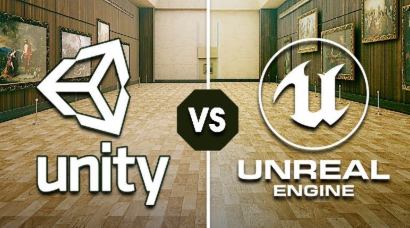
Unreal Engine and Unity are two of the most popular game engines, each with its strengths and ideal use cases. Here’s a detailed comparison to help you decide which might suit your needs:
1. Programming Language
- Unreal Engine: Primarily uses C++ and its visual scripting tool, Blueprints, for creating game logic.
- Unity: Relies on C#, which is generally considered easier to learn and use than C++.
Verdict:
- Beginners might prefer Unity for its C# language.
- Unreal offers more advanced customization for those experienced with C++.
2. Visual Quality
- Unreal Engine: Renowned for its stunning, photorealistic graphics and is often the choice for high-end AAA games, virtual production, and architectural visualization.
- Unity: Can achieve excellent visuals but typically requires more effort and additional tools to match Unreal’s graphical fidelity.
Verdict:
Unreal Engine is superior for projects where graphics quality is paramount.
3. Performance
- Unreal Engine: Optimized for high-performance hardware, making it ideal for cutting-edge PC and console games.
- Unity: More lightweight and versatile for a broader range of platforms, including mobile and VR.
Verdict:
Unity is better for mobile and lightweight applications, while Unreal excels on powerful systems.
4. Pricing
- Unreal Engine: Free to use until your product earns over $1 million in gross revenue, after which a 5% royalty applies.
- Unity: Offers a subscription model (Unity Personal is free for developers with under $200K annual revenue; paid plans scale based on additional features).
Verdict:
Unity’s subscription model can be more predictable, but Unreal’s royalty model might be more affordable for smaller teams or experimental projects.
5. Asset Store and Ecosystem
- Both engines have extensive asset stores, with Unity’s Asset Store being particularly robust for indie developers and small teams.
- Unreal Marketplace focuses on high-quality assets, especially for photorealistic projects.
Verdict:
Unity’s Asset Store provides a broader range of resources, especially for diverse project scales.
6. Learning Curve
- Unreal Engine: Steeper learning curve, especially if you’re new to game development or programming.
- Unity: Generally more beginner-friendly, with extensive documentation and community tutorials.
Verdict:
Unity is easier for newcomers to get started with.
7. Community and Support
- Both engines have strong communities, extensive documentation, and third-party resources. Unity’s larger user base might make it easier to find support for more common issues.
8. Use Cases
- Unreal Engine: AAA games, photorealistic VR/AR, virtual production, architectural visualization.
- Unity: Mobile games, indie projects, 2D games, casual VR/AR experiences.
Conclusion
- Choose Unreal Engine if:
- You want cutting-edge graphics and high-end performance.
- You’re developing for PC or consoles.
- You’re comfortable with a steeper learning curve.
- Choose Unity if:
- You need flexibility for mobile, indie, or 2D projects.
- You prioritize ease of use and a broad range of resources.
- You’re targeting lightweight applications or diverse platforms.
Comments are closed